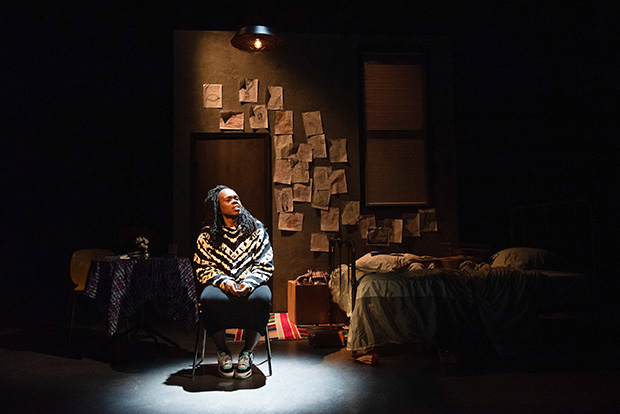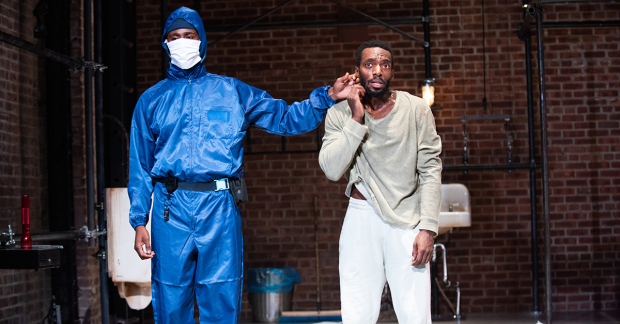Review: The Last of the Love Letters Is Addressed to Everyone and No One At All

(© Ahron R. Foster)
"Two people contemplate the thing they love most and whether to stick it out or to leave it behind. To stay. Or to go. That is the question."
This mystifying synopsis is the only clue audiences are given going into Ngozi Anyanwu's The Last of the Love Letters, the Atlantic Theater's flagship production post-shutdown. Patrons likely won't leave with much more clarity than they entered with. But, at the very least, they will have had the pleasure of soaking up Anyanwu's prose, which floats from high poetry to conversational wit on the winds of her shifting jet stream of consciousness.
The Last of the Love Letters is entirely monologue – an introductory one from Anyanwu herself, whose character is listed as "Playwright & You," followed by a series of diatribes from a tireless Daniel J. Watts, listed as "You No. 2." As the ambiguous monikers suggest, this is one of those plays where time, place, and most other orienting details are dangling question marks. Some get answers. Most do not. We assume that our two "You"s are speaking of each other when they intermittently exult and curse their lost loves, though director Patricia McGregor keeps even that unsettled as her actors' paths never cross. They could be in entirely different universes for all we know – or perhaps in no known universe at all.
For the sake of avoiding spoilers, I'll just say that the conventional bedroom that scenic designer Yu-Hsuan Chen constructs for Anyanwu's stage time reaches a surprising moment of dissolution as we transition to Watts's more cavernous portion of the production. Though, if you look carefully at the spirally scribble-scrabbled collection of artwork bedecking the walls, you may be more prepared for what's to come (Stacey Derosier and Twi McCallum's respective lighting and sound design give a jolt to this scene transition). And yet, there is nothing particularly foreboding in the text of Anyanwu's opening monologue. Familiarity is its signature quality, as evidenced by the many knowing laughs that spurt from the audience (her delivery is like her writing – lyrical and grounded).

(© Ahron R. Foster)
She speaks as if to someone who has both given her the greatest love she has ever known and flushed her body of all of its emotional and physical material. She makes her breathless case for leaving them as much to herself as to her former beloved: one moment, writhing on her bed like a smitten schoolgirl, the next, collapsing to the floor in an amorphous puddle, another, yelling with full-body anger like every woman wishes she'll someday get the opportunity to do (costume designer Dede Ayite starts her off in a form-fitting black dress as if just returned from night of dancing and bad choices). Watts goes through similar leaps and retreats in emotional intensity when he takes the stage— lashing out at his former paramour for leaving, and then suddenly accepting all responsibility for what went wrong (Watts has quite a talent for shifting from terrifying rage to charming, comedic docility at the drop of a hat).
The language is compelling and well-performed. However, the content meanders, as if waiting for the right moment to drop into the heart of the piece, which still seems somewhat undefined, or perhaps just lost in the enigma of it all. We begin to strike at the emotional core when Watts comes upon a collection of Playbills and reminisces about going to the theater with his lover: what it was like to breathe in tandem with a roomful of strangers and share an emotional experience with someone who knew him so well. Covid is never mentioned by name (Xavier Scott Evans's sporadic appearances in a hazmat suit, however, feel particularly of its time) — but those familiar feelings of isolation and loneliness are right in the middle of McGregor's echoing production.
It's almost as if you can see the writing process in the fabric of the piece: Anyanwu in her own personal quarantine dystopia, spewing her feelings of loss and loneliness while her artistic medium of choice slips from the world with no promise of return. The end result is something of an unfinished fever dream, but one I'm delighted a theater full of strangers can finally breathe through together.










